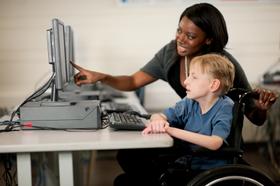The percentage of students achieving proficiency in math was 40-59% (which was higher than the Puerto Rico state average of 32%). The percentage of students achieving proficiency in reading/language arts was 40-59% (which was approximately equal to the Puerto Rico state average of 41%).
School Overview
Grades Offered
Grades Kindergarten-6
Total Students (09-10)
32 students
Total Classroom Teachers
8 teachers
School Rankings
Math Test Scores (% Proficient)
(09-10)40-59%
32%
Reading/Language Arts Test Scores (% Proficient)
(09-10)40-59%
41%
Student-Teacher Ratio
n/a
10:1
American Indian
(09-10)n/a
n/a
Asian
(09-10)n/a
n/a
Hispanic
(09-10)100%
100%
Black
(09-10)n/a
n/a
White
(09-10)n/a
n/a
Hawaiian
(09-10)n/a
n/a
Two or more races
(09-10)n/a
n/a
Eligible for Free Lunch (09-10)
81%
83%
Eligible for Reduced Lunch (09-10)
9%
8%
School Statewide Testing
School District Name
Source: National Center for Education Statistics (NCES), PR Dept. of Education
Frequently Asked Questions
What percent of students have achieved state testing proficiency in math and reading?
40-59% of students have achieved math proficiency (compared to the 32% PR state average), while 40-59% of students have achieved reading proficiency (compared to the 41% PR state average).
How many students attend Manuel Corchado?
32 students attend Manuel Corchado.
What is the racial composition of the student body?
100% of Manuel Corchado students are Hispanic.
What grades does Manuel Corchado offer ?
Manuel Corchado offers enrollment in grades Kindergarten-6
What school district is Manuel Corchado part of?
Manuel Corchado is part of Puerto Rico Department Of Education School District.
Recent Articles

10 Advantages of Public Education in 2025
Explore 10 key benefits of public education in 2025, with fresh statistics, expert insights, and real-world examples for parents and educators.

COVID-19’s Lasting Impact on U.S. 51³Ô¹ÏÍøºÚÁÏ (2025)
Explore how COVID-19 continues to affect U.S. public schools in 2025: learning losses, enrollment shifts, mental health, and recovery strategies.





